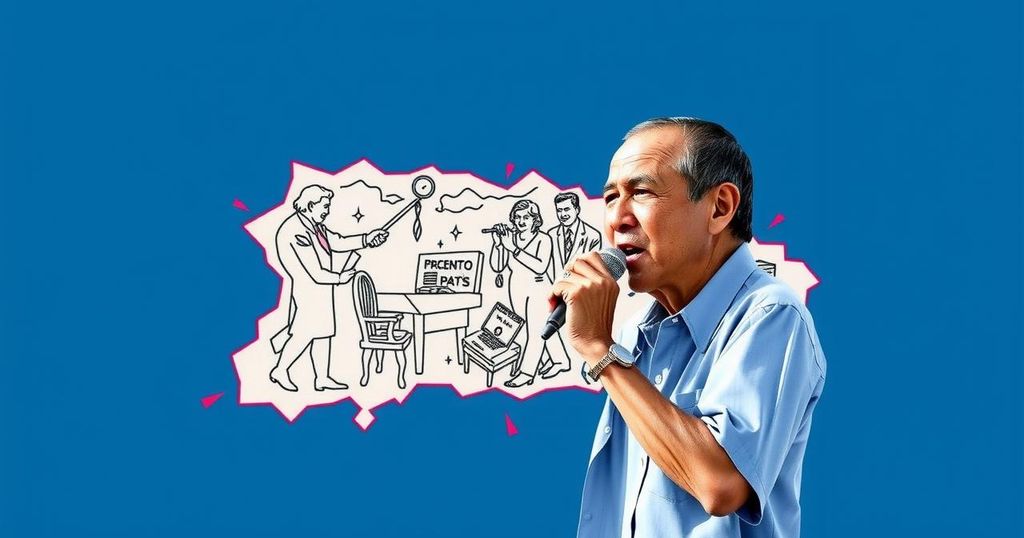Politics
AP, CITIZEN VICTORY MOVEMENT, CITIZENS ’ VICTORY MOVEMENT, COLOMBIA, COMMISSIONER, DALMAU, ELECTION, GA, INDEPENDENCE PARTY, JORGE SCHMIDT NIETO, JUAN, JUAN DALMAU, LA PERLA, LUIS VILLAFAÑE, NEW PROGRESSIVE PARTY, NORTH AMERICA, PARTY, POLITICAL ENDORSEMENTS, PRESIDENTIAL ELECTION 2024, PUERTO, PUERTO RICAN INDEPENDENCE PARTY, PUERTO RICO, SAN JUAN, SOCIAL ISSUES, SOUTH AMERICA, U. S, U.S. ELECTIONS
Leila Ramsay
0 Comments
Puerto Rico Election Day: Historic Shift as Third-Party Candidate Gains Ground
Puerto Rico’s political landscape is shifting as Juan Dalmau, a third-party candidate, gains traction against traditional party leaders in the gubernatorial race. Rising public discontent over corruption and mismanagement has led to increased support for alternative parties, indicating a potential turning point in governance. Voter engagement remains a key issue, with younger voters showing preference for change.
As Puerto Rico approaches its Election Day, significant shifts in the political landscape suggest that traditional party dominance is waning. For the first time, a candidate from a third party, Juan Dalmau, representing the Puerto Rico Independence Party and the Citizen Victory Movement, stands poised to potentially become the island’s next governor. Recent polling indicates that Dalmau is gaining ground against prominent contenders such as Jenniffer González from the New Progressive Party, with only a narrow margin separating them: Dalmau at 29% and González at 31%. Analysts observe that the current election marks a pivotal moment, indicating a yearning for change among the electorate, particularly among younger voters disillusioned with corruption, unreliable public services, and economic mismanagement. Puerto Rican politics have historically been dominated by two primary parties—the New Progressive Party, advocating for statehood, and the Popular Democratic Party, which supports the status quo. However, this longstanding structure has been challenged by a growing sentiment among the populace against corruption, exemplified through a federal fiscal control board established in 2016 due to the island’s crippling debt. This board was formed following Puerto Rico’s declaration of bankruptcy and has faced widespread rejection as the island continues to endure economic hardships, including persistent power outages. Voter participation has also been declining, with significant apathy seen in recent elections. This year, only a modest number of new voters registered, raising concerns about electoral engagement. However, the election dynamics appear to hinge on younger voters, with a trend that favors Dalmau. Additionally, cultural influences, such as the involvement of local superstar Bad Bunny, who has criticized the two main parties, may further shift voter sentiment towards alternative candidates. Moreover, voters will face a seventh nonbinding referendum regarding Puerto Rico’s political status, which underscores the ongoing debate about the island’s future—whether it should pursue statehood, independence, or a negotiated status. Scholars argue that the results may not significantly influence the island’s immediate governance, considering the requirement for Congressional approval for any status change. In this turbulent political context, the upcoming elections on Tuesday carry heightened importance as residents seek accountability and effective governance in light of the challenges they face.
Puerto Rico’s political narrative has long been dominated by two primary parties: the New Progressive Party (NPP) and the Popular Democratic Party (PDP), with both parties historically capturing over 90% of votes. In recent years, however, a growing frustration over governmental corruption, the management of public resources, and the lingering impacts of Hurricane Maria has sparked a wave of discontent among the electorate. This discontent has ushered in the rise of third parties, notably the Puerto Rico Independence Party and the Citizen Victory Movement, with candidates such as Juan Dalmau seeking to capitalize on a shift in public sentiment. The establishment of a federal control board to oversee the island’s finances—a response to a staggering public debt—has further fueled calls for change, impacting how voters perceive their traditional political affiliations. As economic strains persist, particularly with ongoing challenges in the energy sector and the health care system, candidates are being held accountable for presenting viable solutions, yet voter apathy remains a critical issue as participation rates decline significantly from previous elections. This year’s election not only represents a contest for leadership but also a crucial referendum on the political future and governance style on the island.
In summary, the political landscape of Puerto Rico is evolving as traditional party dominance is confronted by the entrance of influential third-party candidates like Juan Dalmau. The upcoming elections reflect a growing demand for accountability amid widespread dissatisfaction with the status quo, particularly among younger voters. The results of this election will likely not only determine the next governor but will also serve as a bellwether for the future trajectory of Puerto Rican politics, especially concerning the island’s political status and the relationship with the United States.
Original Source: apnews.com




Post Comment